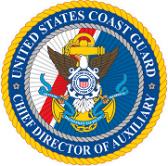Return to Flotilla 8-2's Home Page.

Duties of the Chief Director’s Office
The following non-inclusive list provides a general description of some of the duties that the Chief Director’s Office is tasked with:
- Direct Auxiliary administration within policies established by the Commandant under authority of 14 U.S.C. § 3901, et seq. (Coast Guard Auxiliary).
- Serve as the Commandant’s designated representative to the Auxiliary National Executive Committee (NEXCOM) and Auxiliary National Board.
- In consultation with the Auxiliary National Commodore (NACO), NEXCOM, and the National Board, as necessary, develop and implement policies and procedures that define standards for the development and organization of Auxiliary personnel and programs.
- Develop policies and procedures to define standards that apply in accepting Auxiliary facilities for Coast Guard use and in training to qualify Auxiliarists before assignment to duties.
- Consult and coordinate with Coast Guard program managers to determine requirements for use of Auxiliary resources within the purposes described in 14 U.S.C. § 3901
- In consultation with the NEXCOM, develop plans and procedures to achieve and maintain Auxiliary strength characteristics consistent with identified Coast Guard requirements.
- Coordinate requests for and monitor program, facility, and support manager use of Auxiliary personnel and facilities.
- Provide policy and guidance to operational and support commanders on the use and support of Auxiliary personnel and facilities as applied both domestically and internationally.
- Delegate to Auxiliary elected and appointed leaders such matters necessary or appropriate for Auxiliary functioning, organization, and internal administration.
- On behalf of the Commandant, review, approve or disapprove, and implement recommendations of the National Board that affect official publications, the standing rules and bylaws, awards, elements of elected and appointed office, and internal matters of the Auxiliary.
- Actively promote Auxiliary interests
- Establish and monitor appropriate operational proficiency standards for Auxiliary personnel, facilities, and resources.
- Maintain liaison with appropriate Coast Guard program managers to assist in development and maintenance of Auxiliary policies and training.
- Maintain oversight of and participate in developing and maintaining long-range Commandant (CG-BSX-1) strategic plans.
- Develop appropriate measures of effectiveness and analyze relevant data and alternatives required to support budgetary and policy decisions necessary to ensure adequate levels of Auxiliary support.
- Serve as the planning element for all Auxiliary personnel, facility, and resource related issues.
- Develop, review, and evaluate all national and service-wide plans, policies, procedures, standards, resource, and training requirements necessary for Auxiliary administration and performance.
- Coordinate requests for, and monitor, program, facility, and support manager use of Auxiliary personnel and facilities.
- Maintain oversight of Auxiliary international engagement.
- Prepare, review, and deliver briefings and replies to queries regarding Auxiliary programs (e.g., briefings and Q&As as requested by Congressional staffs, DHS, and other agencies; Background Book Documents; Questions for the Record; replies to Congressionals, letters to the President, letters to SECDHS, CCG; data calls; talking points; myriad queries from Coast Guard and field units).
- Serve as a member of the AUXDATA/AUXINFO Configuration Control Board (CCB) and AUXDATA Modernization Project.
- Engage in organizational issues and serve as principal POC for Coast Guard strategic transformation matters.
Memorandums of Understanding (MOU) & Memorandums of Agreement (MOA)